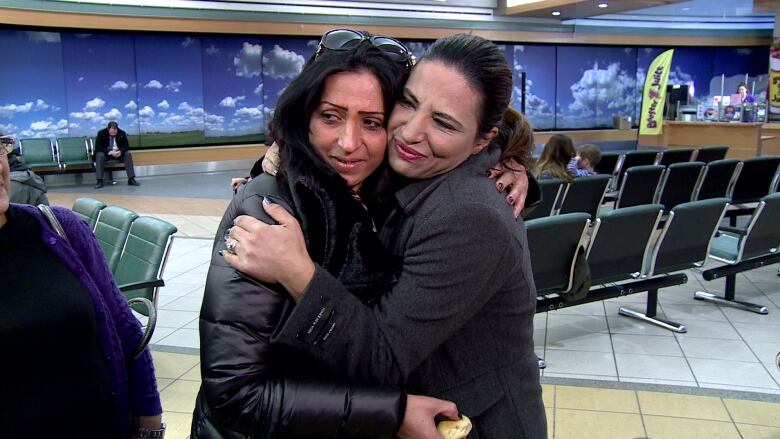Edmonton woman's hope for life-saving kidney crushed by sister's diabetes diagnosis
A disappointing blow for Janet Machtoub, who has waited 15 years for a kidney donation

It was a move two sisters thought would save both of their lives.
Laila Maaen had fled war-torn Syria for reprieve in Lebanon. Her sister, Janet Machtoub, was in Edmonton in desperate need of a kidney transplant.
With help from the Mennonite Central Committee, Maaen came to Canada as a refugee on Dec. 31, 2015.
"You know when you're waiting for something and you've been waiting for a long, long time for something and you need it?" Machtoub told CBC News Monday about their emotional reunion at the Edmonton International Airport.
"I was so happy."
- Refugee arrives in Edmonton hoping to save sister's life
- Syrian refugee plans to donate kidney to sister upon arrival in Canada
But her high hopes were dashed when, months later, Maaen was diagnosed with diabetes.
She wasn't able to donate her kidney.
So Machtoub is still on the wait list — where she's been for more than 15 years.
"It's like waiting for surprise and when you get the surprise, when you open it, you find it is like empty, you know — that's what happened to us," Machtoub said.
It's like waiting for surprise and when you get the surprise, when you open it, you find it is like empty, you know — that's what happened to us.- Janet Machtoub, waiting for a kidney donation
According to the most recent data from the Kidney Foundation of Canada, about 3,600 people are waiting for a transplant.
A 2015 Alberta Health Services report says the number of people receiving transplants over the past decade has remained stable, but there has been a 40 per cent increase in the number of people with end-stage kidney disease.
Machtoub and her husband, Houssam, were engaged in Aley, Lebanon. They married in Edmonton — where she hoped to finish her education — shortly after her arrival in 1999.
She was healthy after the birth of their son, Riad. But when the couple's daughter, Reem, was born in 2001, her kidneys failed.
Machtoub was 21 years old when she first started dialysis.

At first, it was in five hour increments, three time per week. Now, it's nine hours each day.
"It's like routine in your life," Machtoub said. "It's like you're going to work nine hours."
Only Machtoub — who is battling high blood pressure, intense fatigue, and heart problems as a result of her prolonged treatment — can't go to work.
She's missed out on a lot of things. But spending quality time with her one sister who's now in Canada is no longer one of them.
'At least I did something for them'
Maaen and her four adult children are living in north Edmonton and learning English.
The sisters visit every week.
"I'm happy they are here," Machtoub said. "At least I did something for them,"
But they have other siblings who are still fighting for their survival overseas.
Mona Maaen fled Aleppo with her three children on Sunday, after her husband was killed.
Machtoub wants to bring that family to Edmonton as well.
"I'm trying to help her enter, but I don't know if they will let her," Mactoub said.
"It's the stress, you know? You're worried about yourself and you're worried about them, too.
"At least I'm safe here."
Machtoub is holding out hope for a new kidney from a healthy donor.
With relief from dialysis, she said she'll try to go back to school. She wants to go to NAIT, where she plans to study nursing.
When she can work, she'd like to care for patients with kidney disease.
She also wants to travel, but not too far — just to Wainwright, or to Calgary, where her husband's extended family live.
With files from Rick McConnell